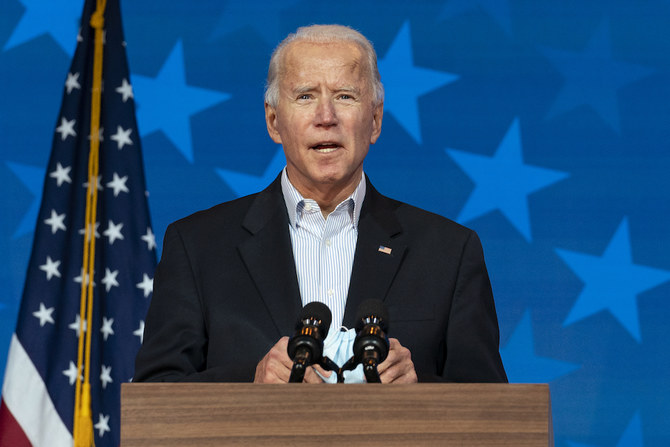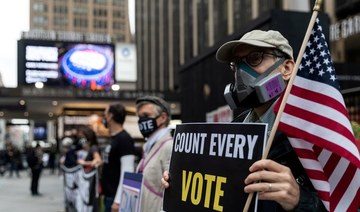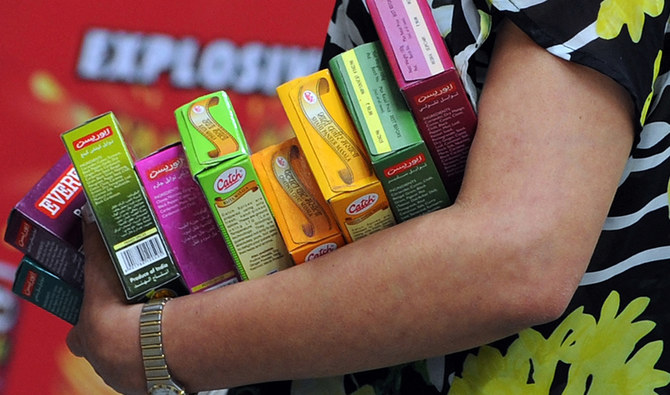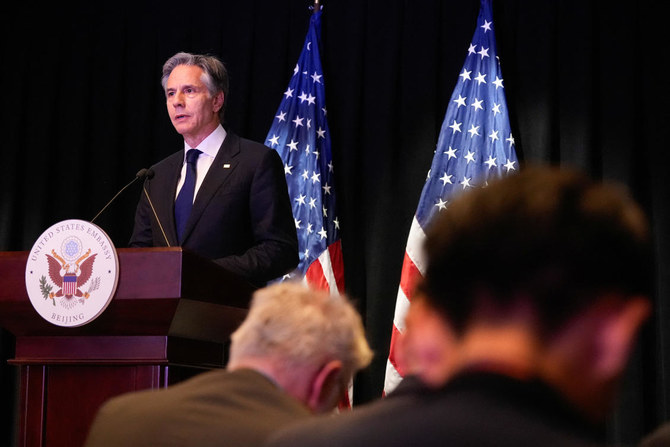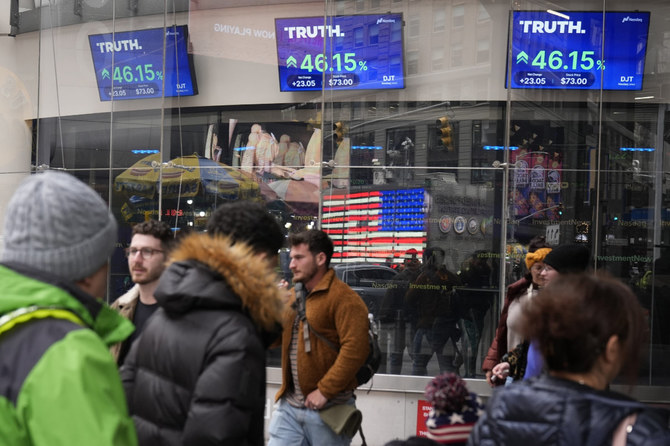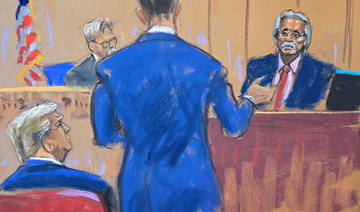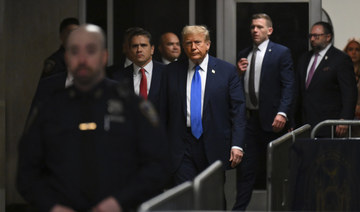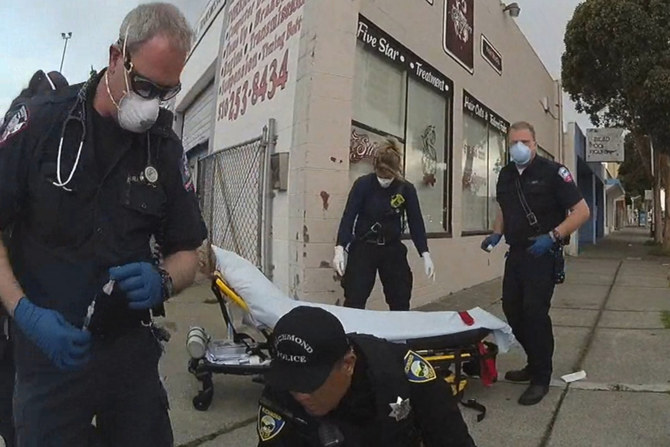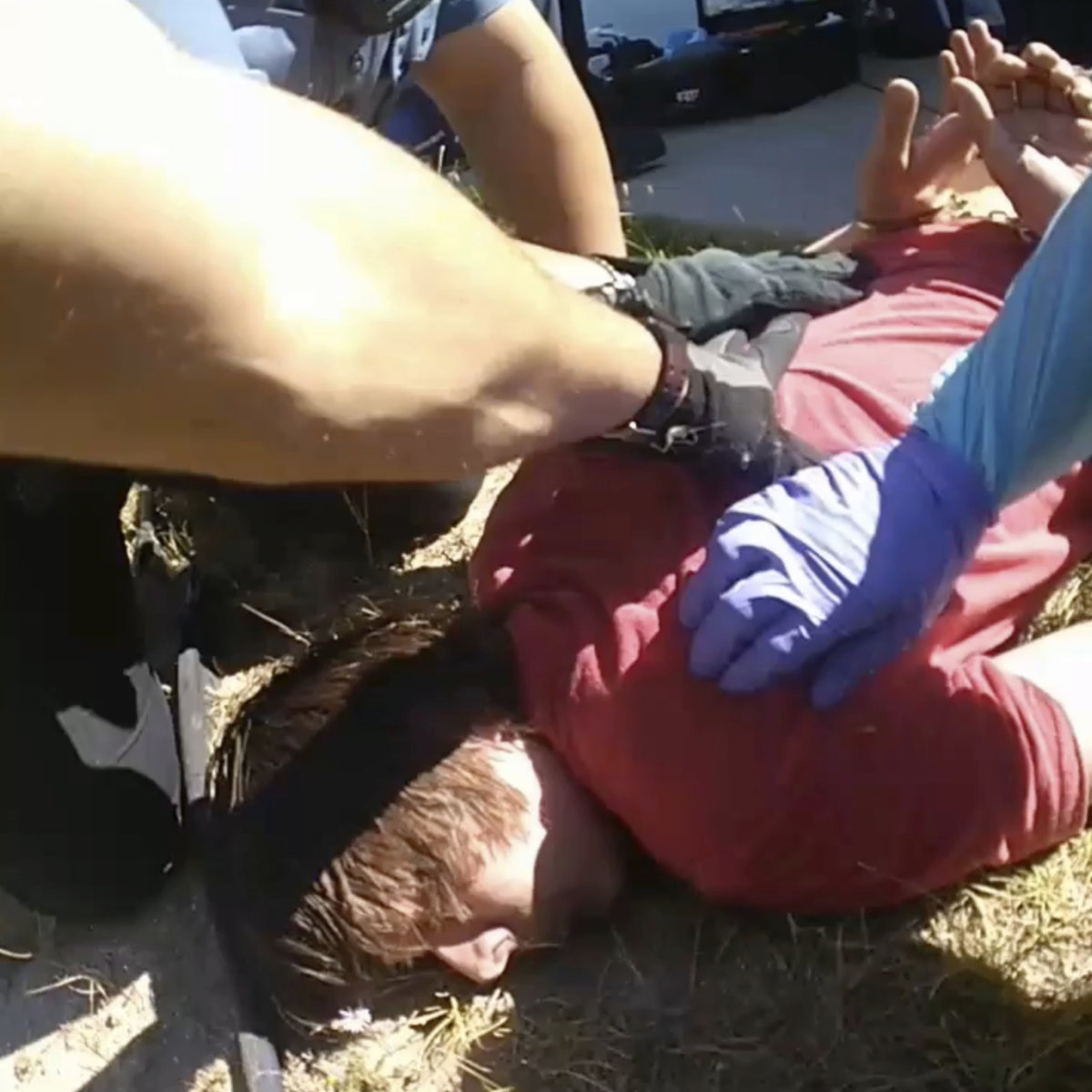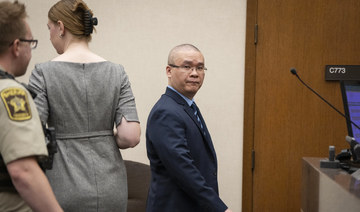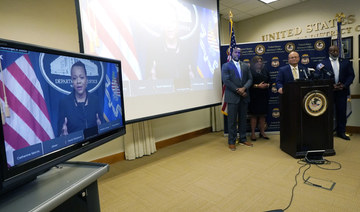LONDON/RIYADH: With his re-election chances fading as more votes are counted in a handful of battleground states, US President Donald Trump launched an extraordinary assault on the country’s democratic process from the White House on Thursday, claiming the election was being “stolen” from him.
Offering no evidence, Trump lambasted election workers and alleged fraud in the states where results from a dwindling set of uncounted votes are pushing Democrat Joe Biden nearer to victory.
“This is a case where they’re trying to steal an election,” Trump said, who spoke for about 15 minutes in the White House briefing room before leaving without taking questions.
Biden, the former vice president, overtook the Republican incumbent’s leads in Pennsylvania and Georgia even as he maintained narrow advantages in Nevada and Arizona, moving closer to securing the 270 votes in the state-by-state Electoral College that determines the winner.
So far, Biden has 264 electoral votes — just six away from the White House — and Trump has 214.
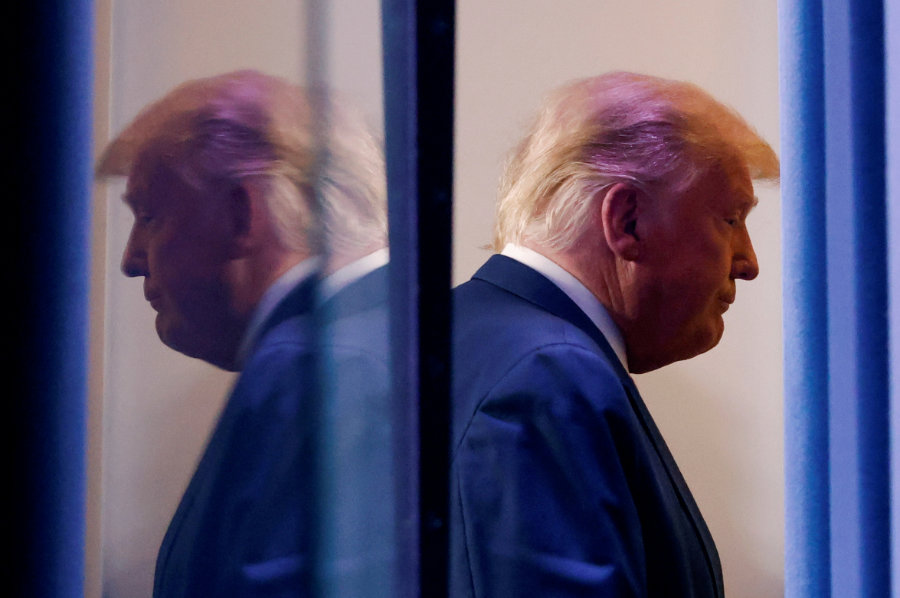
US President Donald Trump is reflected as he departs after speaking about the 2020 US presidential election results at the White House in Washington on Nov. 5, 2020. (REUTERS)
Trump’s campaign lost court rulings in the closely contested states of Georgia and Michigan on Thursday, even as it vowed to bring a new lawsuit challenging what it called voting irregularities in Nevada.
In the Georgia case, the campaign alleged that 53 late-arriving ballots were mixed with on-time ballots. In Michigan, it had sought to stop votes from being counted and obtain greater access to the tabulation process.
State judges tossed out both lawsuits on Thursday.
James Bass, a Superior Court judge in Georgia, said there was “no evidence” that the ballots in question were invalid.
In the Michigan case, Judge Cynthia Stephens said: “I have no basis to find that there is a substantial likelihood of success on the merits.”
FRIDAY NOVEMBER 6 (All times GMT)
23:50 - Democrat Joe Biden said Friday that he was going to win the US presidency as his lead grew over President Donald Trump in battleground states, although television networks held off from declaring him the victor as officials continued to count votes.
#LIVE: @JoeBiden addresses the #US nation. #Elections2020Resultshttps://t.co/eTjpH9RbhQ
— Arab News (@arabnews) November 7, 2020
“The numbers tell us ... it’s a clear and convincing story: We’re going to win this race,” Biden said, adding that he and his running mate Kamala Harris were already meeting with experts as they prepare for the White House.
Biden’s speech was originally planned as a victory celebration, but he changed his approach in the absence of an official call from television networks and other election forecasters.
19:30 - Rundown of today's election news:
- Biden on brink of presidency after taking lead in Pennsylvania.
- Georgia to recount after ‘virtual tie’ between the two candidates.
- Biden extends lead over Trump in Nevada.
17:40 - Former Republican candidate Mitt Romney has called out Trump for peddling accusations of voter fraud in the election.
He is not the only member of the GOP to disagree with the president. Other Republicans have said Trump should provide evidence of the so-called fraud.
17:00 - Joe Biden's campaign warned Friday that Trump could be escorted from the White House if he refuses to admit defeat in America's knife-edge election. Biden is edging towards the presidency after pulling ahead in the key states of Pennsylvania and Georgia.
But Trump has made it clear that he is not ready to concede, launching unsubstantiated claims of voter fraud and claiming falsely that he had been cheated out of relection.
"As we said on July 19th, the American people will decide this election. And the United States government is perfectly capable of escorting trespassers out of the White House," said Biden campaign spokesman Andrew Bates.
16:40 - BALLOT UPDATE: Biden’s leads in Pennsylvania and Nevada have grown once again with the latest updates from the two states, with the Democratic candidate now leading by 9,027 votes in the former, 22,076, or 1.7% of the total, in the latter.
His lead in Pennsylvania is likely to grow as ballots come in from Philadelphia.
15:40 - The office of the Georgia Secretary of State gives an update on ballot counting in the key state, which according to latest figures would be declared for Biden.
However, Brad Raffensperger has just confirmed there will be a recount in the state and promised transparency in the process.
“There will be a recount in Georgia,” Raffensberger said, with just 1,500 separating the two candidates - which in US elections is seen as a virtual tie.
15:15 - As Pennsylvania looks to turn to the Democrats, Trump has weighed in by calling into question the state's election history.
However, even Pennsylvania’s Republican senator, Pat Toomey, has rebuked Trump's claims of widespread fraud.
“The president’s speech last night was very disturbing to me because he made very, very serious allegations without any evidence to support it,” Toomey said on Friday morning.
14:30 - The 2020 presidential election has been a roller-coaster ride for American voters, whichever side they are on, as Arab News' Ephrem Kossaify writes. You can read his full account here.
13:50 - BREAKING: In the battleground state of Pennsylvania, Biden is ahead by 0.1% - or 5,587 votes - as voting continues. Pennsylvania is worth 20 electoral votes.
12:30 - Some Republican lawmakers are criticizing President Donald Trump’s unsupported claim that Democrats are trying to “steal” the election, saying Trump's comments undermine the US political process and the bedrock notion that all Americans should have their vote counted.
Senator Pat Toomey of Pennsylvania, whose state is a key battleground in the presidential election, said Friday he had seen no evidence to support Trump's claim Thursday evening of fraud in balloting.
“The president’s speech last night was very disturbing to me because he made very, very serious allegations without any evidence to support it," Toomey told “CBS This Morning.”
09:50 Democrat Joe Biden pulled ahead in the crucial battleground state of Georgia, US media said, with votes still left to count. The former vice president ate away at Trump's initial lead in the southern state and is now ahead by 917 votes, CNN and Fox News reported.
08:00 Biden continues to close the gap in Georgia - there's now just 665 votes between him and Trump

05:00 Several major US television networks cut away from live coverage of Trump's event and there were signs of cracks in Republican support.
Representative Will Hurd called Trump's call to stop vote-counting "dangerous and wrong," saying it "undermines the very foundation this nation was built upon."
And conservative Rupert Murdoch's powerful media empire appeared to shift tone, with his New York Post calling Trump's fraud allegations "baseless" and Fox News refusing Republican pressure to rescind its projection that Trump would lose Arizona, vital for his chances.
Most major television networks gave Biden a 253 to 214 lead in Electoral College votes, which are largely determined by state population, after he captured the crucial states of Wisconsin and Michigan on Wednesday.
04:00 Biden, who has promised to heal a country bruised by Trump's extraordinarily polarizing four years in power, appealed for "people to stay calm."
"We have no doubt that when the count is finished, Senator (Kamala) Harris and I will be declared the winners," he said in comments to reporters in his hometown of Wilmington.
"The process is working," he said. "The count is being completed. And we will know soon."
03:00 - At a news conference in Las Vegas on Thursday, former Nevada Attorney General Adam Laxalt and other Trump campaign surrogates, including former administration official Richard Grenell, gave no evidence to support their allegations of irregularities and did not answer questions from reporters.
"We believe that there are dead voters that have been counted. We are also confident that there are thousands of people whose votes have been counted that have moved out of Clark County during the pandemic," Laxalt said.
He said a lawsuit would be filed in federal court to ask the judge to "stop the counting of improper votes."
Joe Gloria, an election official in Clark County, told reporters there was no evidence of improper ballots being processed.
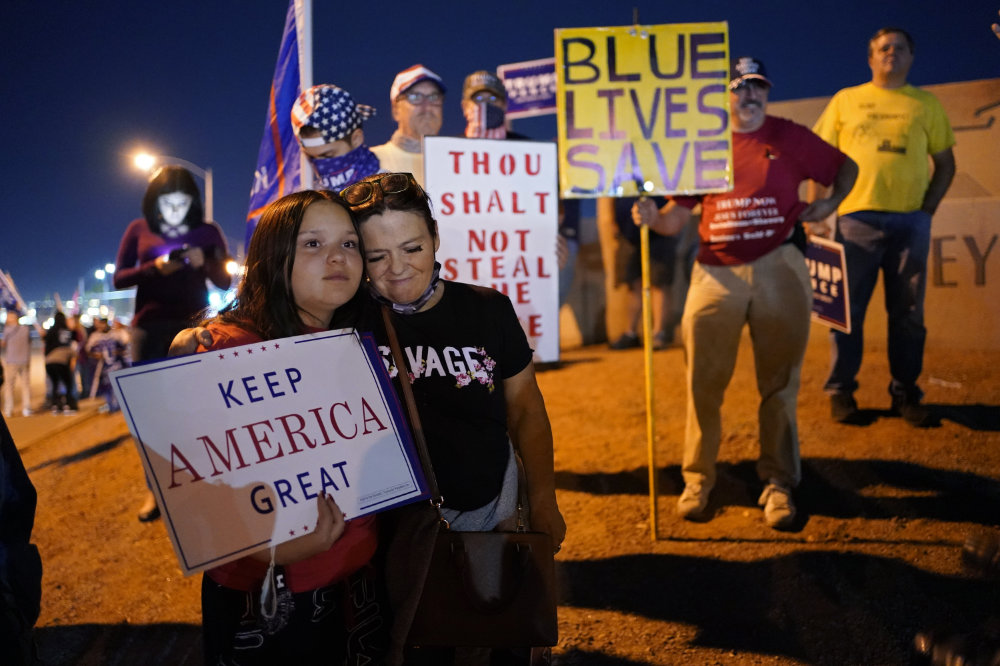
Supporters of President Donald Trump protest the Nevada vote in front of the Clark County Election Department on Nov. 5, 2020, in Las Vegas. (AP Photo/John Locher)
02::00 - After fuming in private and tweeting his grievances in all caps in the past two days, Trump held a press conference in the White House and deliver a diatribe most notable for his litany of false statements about the election and his attempt to cast doubt on the integrity of the Democratic process.
“If you count the legal votes, I easily win. If you count the illegal votes, they can try to steal the election from us,” Trump claimed. He left without taking questions.
In fact, there is no evidence that any votes cast illegally are being counted or that the process is unfair and corrupt. he ballot-counting process across the country largely has been running smoothly with no evidence of widespread fraud or problems.
Trump’s remarks followed a series of Twitter posts from Trump earlier in the day that called for vote counting to stop, even though he currently trails Biden in enough states to hand the Democrat the presidency.
With just a handful of states yet to be decided, Biden had a clear advantage over Trump, but the president still retained a narrow path to the 270 electoral votes needed to win reelection.
00:15 - Arab News' Frank Kane writes: In such a volatile situation as the US at the moment, nothing is certain. Perhaps the best investment play now would be to buy the Vix Index in anticipation of further volatility.

00:11 - President Donald Trump is renewing his unfounded claims that Democrats are trying to “steal” the election from him. He did not back up his claim with any details or evidence. State and federal officials have not reported any instances of widespread voter fraud.

Trump spoke from the White House briefing room on Thursday, unleashing harsh criticism of pre-election polling that showed him trailing Democrat Joe Biden and claiming without evidence that the ballot-counting process is unfair and corrupt. He also renewed his criticism of widespread use of mail-in balloting in the pandemic.
THURSDAY NOVEMBER 5
23:48 - President Trump makes a statement at the White House.
22:00 - The Trump campaign holds another press conference from the streets of Philadelphia, maintaining the message that they believe there has been fraud committed during this election and how they are fighting back. Watch below.
21:30 - Joe Biden issues a very short statement on the latest in the race, telling everyone to stay calm and that he was sure he and Kamala Harris would be declared the winners of the election. Watch below.
20:30 - Counting officials in Georgia, which could decide the presidential election result, have been stressing the need for patience and accuracy as they count the final votes. Donald Trump’s lead in Georgia has been shrinking since he went ahead on election night. He still holds a lead of 12,768 votes.
"The issue we have in Georgia is... it's a close vote," Gabriel Sterling, Georgia's voting system implementation manager, said. "There's other states that have more votes to count than we do, but it's a wide margin, so nobody cares."
19:00 - Facebook said it had taken down a rapidly growing group where supporters of Trump posted misinformation, violent rhetoric and organized protests against the baseless claim that Democrats were stealing the election. The group had ballooned to more than 365,000 members in one day.
On Thursday afternoon, the "Stop the Steal" group, which called for "boots on the ground to protect the integrity of the vote," was adding 1,000 new members every 10 seconds.
"The group was organized around the delegitimization of the election process, and we saw worrying calls for violence from some members of the group," a Facebook spokeswoman said in a statement.
18:20 - The registrar of voters for Nevada's Clark County said he was hopeful that the majority of the 63,262 ballots still left to process would be counted by Saturday or Sunday - many of which are expected to be in favor of Biden.
Joe Gloria also said he was “not aware of any improper ballots that are being processed” when asked about the Trump campaign claims of voter fraud in the state of Nevada.
17:45 - Protestors supporting both candidates have taken to streets of cities across the US, with the main thrust of their passion being aimed at ballot counting and ensuring every vote is counted. Watch supporters of both in rival protests in Philadelphia below.
17:30 - “The truth is that for many Americans, elections are not really very satisfying experiences, and that usually means the biggest losers in an election are the voters themselves, no matter who they voted for,” says Ray Hanania of the US election in his latest opinion piece. Read the full article below.
Opinion
This section contains relevant reference points, placed in (Opinion field)
17:00 - A judge in Georgia has dismissed a lawsuit filed by the Trump campaign over absentee ballots in the state, after they alleged officials were attempting to count invalid ballots in the state.
When asked for evidence of the claim, the Trump campaign could not produce any, according to media reports.
Trump’s lead in Georgia continues to shrink, as it now stands at 14,857, or just 0.3% of the total vote.
16:45 - In a seemingly perfectly-timed press briefing, the Trump campaign continues to emphasize its belief there has been widespread fraud committed in this election, using ordinary voters and their experiences to back up their point. Watch below.
16:25 - The Biden campaign have held a press conference on the state of the election so far - the message was resolute and simple. Joe Biden will be the next president of the United States. They then laid out why they believe the Republican legal challenges have "no merit." Watch below.
16:00 - Arizona state officials say there are about 450,000 ballots still to be counted in the Western battleground.
The Associated Press, which called the state for Biden, said it was monitoring that vote count as it came in. Biden holds a 2.35 percentage point lead over Trump in Arizona, an advantage of about 68,000 votes.
The vast majority of the ballots yet to be counted are from Maricopa County, the most populous area of the state.
WATCH: Footage from Wednesday evening, showing Trump supporters chanting "We want Trump" outside a vote-counting centre in downtown Phoenix as Maricopa County workers attempted to continue to count ballots.
The Associated Press continues to watch and analyze vote count results from Arizona. We will follow the facts in all cases.
AP executive editor Sally Buzbee
15:45 - A spokesperson for the Georgia Secretary of State Brad Raffensperger has just told media that with 60,000 votes left to count officials are prioritizing accuracy over speed, while also acknowledging some county officials had forgotten to click the “upload” button to post their vote counts, adding that the state has sent out reminders about that.
Trump’s lead in Georgia has narrowed to about 18,000 votes.
15:15 - Twitter flagged a post by President Donald Trump on Thursday that said votes received after Election Day in the United States would not be counted.
The company has applied labels to multiple tweets sent by Trump in recent days, warning users that information is disputed and might be misleading, as he fights Democratic rival Joe Biden to keep his place in the White House.
14:20 - Trump has demanded election officials stop counting valid ballots in a new tweet. However, that would not work in his favor because Biden is currently leading in Nevada by 7,500 votes and he would claim the six electoral votes required to take the White House...
13:30 - With litigation from the Republican camp looking more and more likely, here's a handy guide to the rules on recounts in the contentious states:
GEORGIA
Automatic recount: No
Recount law: A candidate can request a recount if the margin of victory is less than or equal to 0.5 percentage point.
Deadline: A recount must be requested within two business days after results have been certified.
Who pays: State law does not specify who is responsible for recount costs.
MICHIGAN
Automatic recount: Yes
Recount law: A recount is required if the margin of victory is less than or equal to 2,000 votes.
Deadline: Request for a recount should be made within 48 hours of the vote canvass.
Who pays: The candidate requesting the recount.
NEVADA
Automatic recount: No
Recount law: A candidate who has been defeated can request a recount, regardless of the margin of victory.
Deadline: A recount must be requested within three business days after the state's vote canvass.
Who pays: The candidate asking for the recount.
PENNSYLVANIA
Automatic recount: Yes
Recount law: A recount is automatic if the margin of victory is less than or equal to 0.5 percentage point. Two other avenues for requesting recounts include requiring at least three voter signatures that attest to an error in the vote tally, and going to state court to file petitions alleging fraud and error.
Deadline: By 5 p.m. on the second Thursday following the election, for automatic recounts. If a recount is requested, the deadline is five days after the election.
Who pays: The candidate requesting the recount.
Trump’s campaign said on Wednesday it had filed a lawsuit in Michigan to stop state officials from counting ballots. Three cases were launched in Pennsylvania regarding mail-in-ballots and ballot counting.
A judge on Wednesday said Postmaster General Louis DeJoy must answer questions about why the USPS failed to complete a court-ordered sweep for undelivered ballots in about a dozen states before a Tuesday afternoon deadline.
The Trump campaign on Wednesday evening filed a lawsuit in state court in Chatham County, Georgia. Unlike the Pennsylvania and Michigan actions, that lawsuit is not asking a judge to halt ballot counting. Instead, the campaign said it received information that late-arriving ballots were improperly mingled with valid ballots, and asked a judge to enter an order making sure late-arriving ballots were separated so they would not be counted.
05:57 - Dozens of angry Trump supporters continue to converge on vote-counting centers in Detroit and Phoenix as the returns went against him Wednesday in the two key states, while thousands of anti-Trump protesters demanding a complete tally of the ballots in the still-undecided election took to the streets in cities across the US.
01:55 - Protests across several states are calling for all votes to be counted.
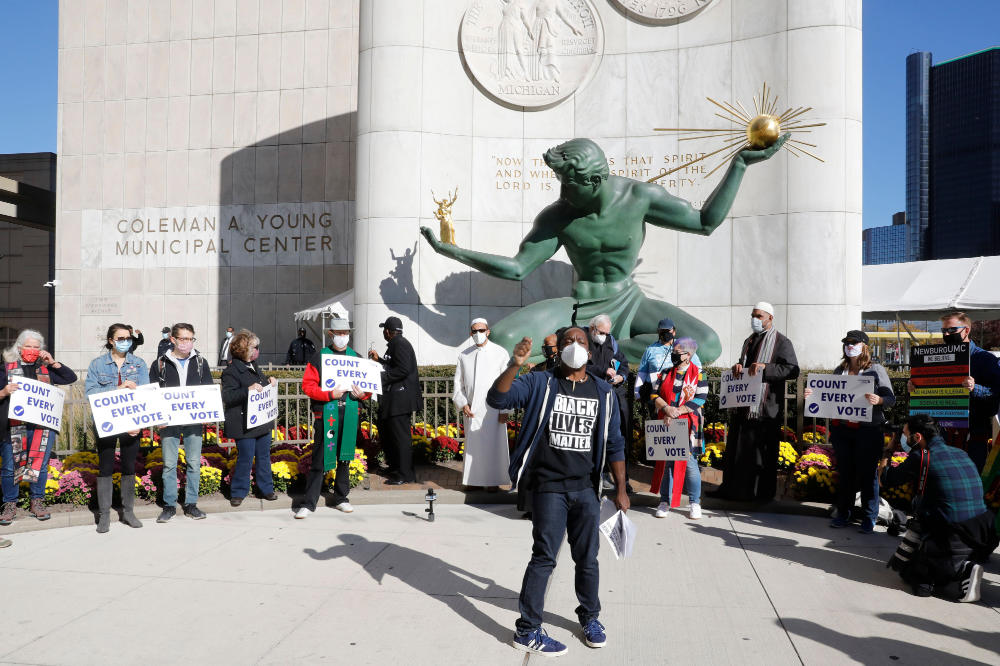
"Detroit Will Breathe" organiser Tristan Taylor, speaks at a rally where people want every vote counted from the 2020 presidential election, on Woodward Avenue November 4, 2020 in Detroit, Michigan. (AFP)
01:50 - The election scrambled seats in the House and Senate but ultimately left Congress much like it began, deeply split as voters resisted big changes despite the heated race at the top of the ticket for the White House.
It’s an outcome that dampens Democratic demands for a bold new agenda, emboldens Republicans and almost ensures partisan gridlock regardless of who wins the presidency. Or perhaps, as some say, it provides a rare opening for modest across-the-aisle cooperation.
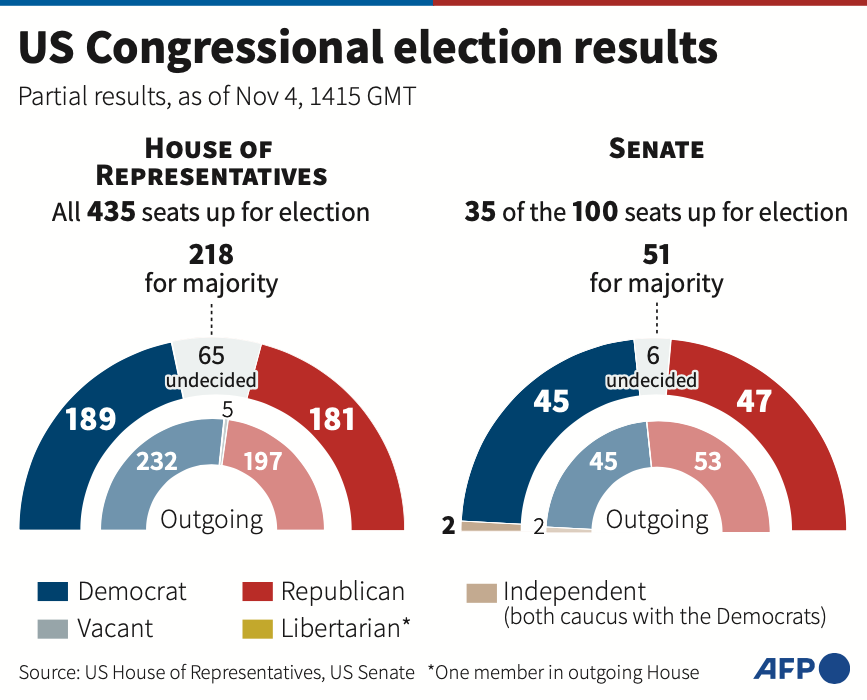
Speaker Nancy Pelosi was on track to keep control of the Democratic House, but saw her majority shrinking and her leadership called into question. Republicans' control of the Senate tilted their way as GOP senators fended off an onslaught of energized challengers, though a few races remained undecided Wednesday.
Senate Majority Leader Mitch McConnell said Wednesday he’s confident “no matter who ends up running the government” they’ll be “trying to overcome all that and get results.”
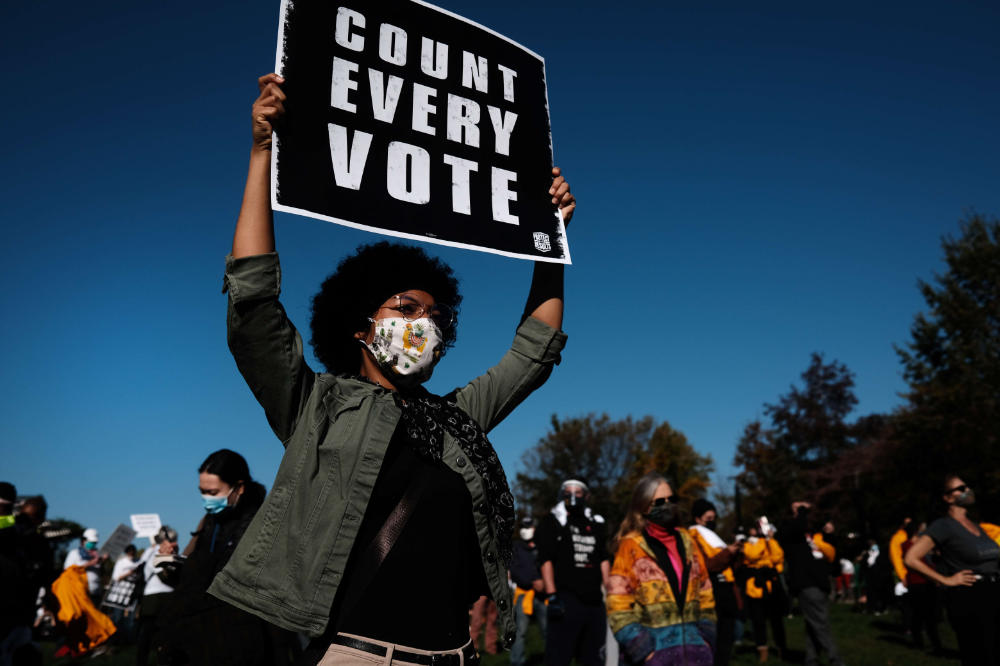
People participate in a protest in support of counting all votes as the election in Pennsylvania is still unresolved. (Spencer Platt/Getty Images/AFP)
01:15 - President Donald Trump's campaign filed lawsuits in Pennsylvania, Michigan and Georgia, laying the groundwork for contesting battleground states as he slipped behind Democrat Joe Biden in the hunt for the 270 Electoral College votes needed to win the White House.
WEDNESDAY NOVEMBER 4
21:45 - The Trump campaign hold a press conference in Philadelphia saying they will challenge the vote count there, just as they said they would do in Wisconsin - with former New York City mayor and Trump lawyer Rudy Giuliani saying the complain could be taken to a national level.
21:20 - Biden says he expects to win the presidential election, saying he believes it is clear his campaign is winning enough states to win the presidency.
After a long night of counting, it's clear that we're winning enough states to reach 270 electoral votes needed to win the presidency. I'm not here to declare that we've won, but I am here to report that when the count is finished, we believe we will be the winners.
Joe Biden
21:10 - LIVE: Biden and Kamala Harris making remarks from Wilmington
20:30 - The Trump vs. Biden race is still too close to call in handful of swing states - Arab News' Ephrem Kossaify assessed the lay of the land on Wednesday, read more here...
20:00 - A panel of veteran American political consultants on Wednesday speaking to Arab News' Ray Hanania concurred that the process of analyzing and covering US elections had changed dramatically and that mail-in ballots had significantly impacted on the way polls were conducted.
READ MORE HERE: Biden-Trump election impacted by COVID-19, change in voting
19:20 - RESULT: Biden picks up a huge win in Wisconsin - just 22 electoral votes between him and the presidency...
18:55 - The Trump campaign has filed a lawsuit in Michigan to stop the counting of ballots.
"We have filed suit today in the Michigan Court of Claims to halt counting until meaningful access has been granted. We also demand to review those ballots which were opened and counted while we did not have meaningful access," the campaign said in a statement.
18:00 - While a nation holds its breath and awaits the results of one of the tightest battles for the White House in a generation, one candidate knows his fate — rapper Kanye West will not be US president in 2020.
But that has not deterred him from a possible second run for top office in 2024, if a tweet earlier today is anything to go by.
The rapper, who decided to run late in the game as an independent candidate under the Birthday Party, received approximately 60,000 votes from the 12 states where he managed to get on the ballot.

17:30 - More than one million American Muslims participated in the 2020 US election, with nearly 70 percent voting for Democratic presidential candidate Joe Biden, an exit poll has showed.
READ MORE HERE: Poll reveals record Muslim vote in US election
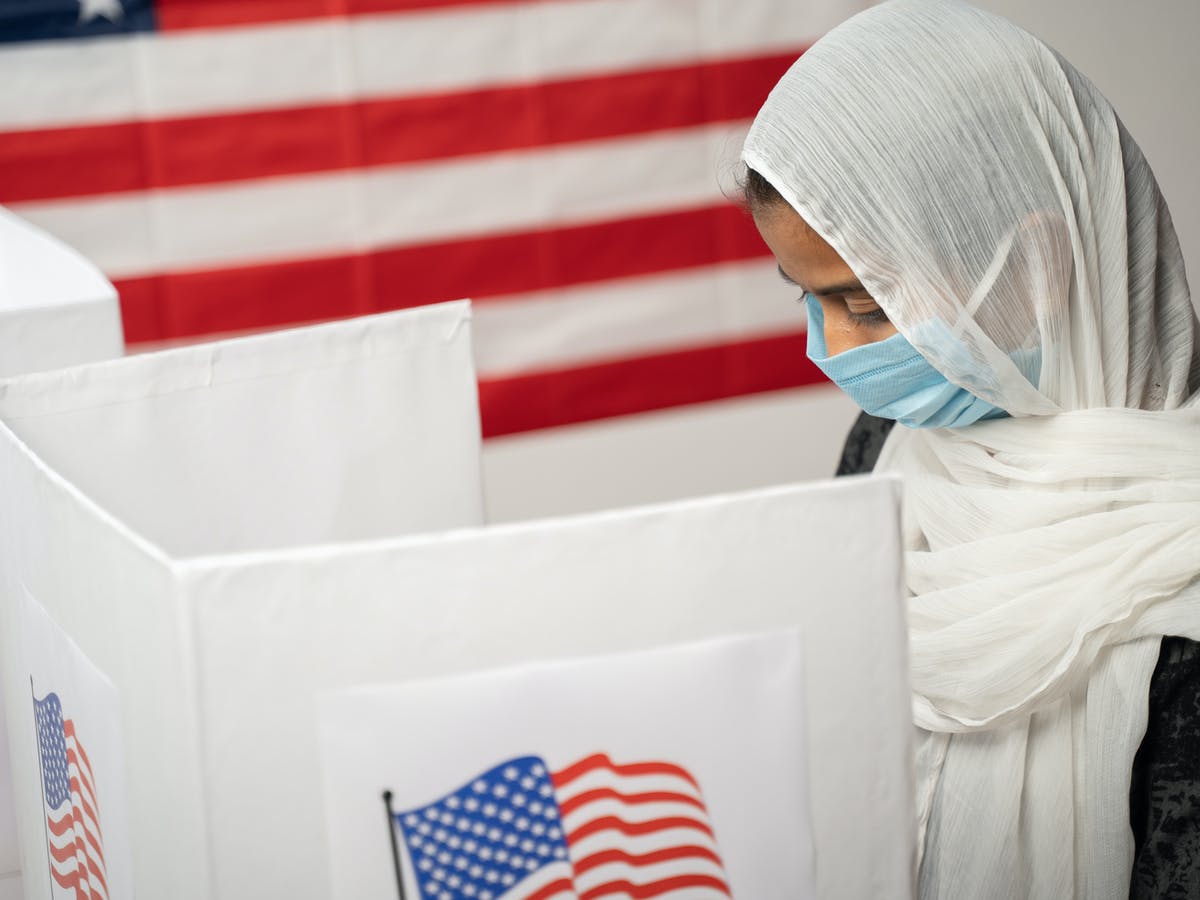
17:15 - Senate Majority Leader Mitch McConnell is discounting President Donald Trump’s early claim that he'd already won the election, saying it’s going to take a while for states to conduct their vote counts.
McConnell also says he is untroubled by Trump’s vows to contest the vote count in key states.
Claiming you’ve won the election is different from finishing the counting... you should not be shocked that both sides are going to have lawyers there. The courts will decide disputes. That’s the way we do it in this country.
Senate Majority Leader Mitch McConnell
15:55 - Donald Trump has taken a further swipe at vote counting, claiming there had been "surprise ballot dumps" in states where he had been leading Joe Biden.
"Last night I was leading, often solidly, in many key States, in almost all instances Democrat run & controlled," Trump tweeted. "Then, one by one, they started to magically disappear as surprise ballot dumps were counted.”
The comments follow Trump’s premature declaration as having won the election.
Biden’s team responded saying Trump faced an embarrassing defeat before the Supreme Court if he asks it to invalidate ballots counted after Election Day.
14:30 - In case you missed it, Arab News US correspondent Ray Hanania discussed on his radio show a short time ago the latest developments in the election with guests Michigan-based pollster Dennis Deno and political consultant Jeff Davis.
14:00 - Things still remain incredibly tight but latest numbers indicate a glimmer of hope for Joe Biden. The Democrat held slender leads in Michigan and Wisconsin - two states that helped Trump to the White House in 2016.
Trump still holds a lead in Pennsylvania - a state he would have to win to return to remain president.

09:00 - Joe Biden's campaign team have responded to Trumps threat to go to the Supreme Court, stating that it has legal teams standing by if Trump follows through with his threat.
“If the president makes good on his threat to go to court to try to prevent the proper tabulation of votes, we have legal teams standing by ready to deploy to resist that effort," Biden campaign manager Jen O’Malley Dillon said in a statement.
It's not surprising that both sides are getting nervous - it's still a tight race with no clear winner.
08:08 - Biden wins Arizona and its 11 electoral votes, flipping a critical battleground state that Trump won four years ago and that could help determine which candidate wins the presidency
07:21 – Donald Trump speaks at the White House.
Says he will be going to the US Supreme court to stop all vote counting.
Opens with a joke: “This is without question the latest press conference I have ever had.” Tells his supporters that millions voted for him tonight but a “very small minority” have tried to stop that.
“We won’t stand for that,” he pledges.
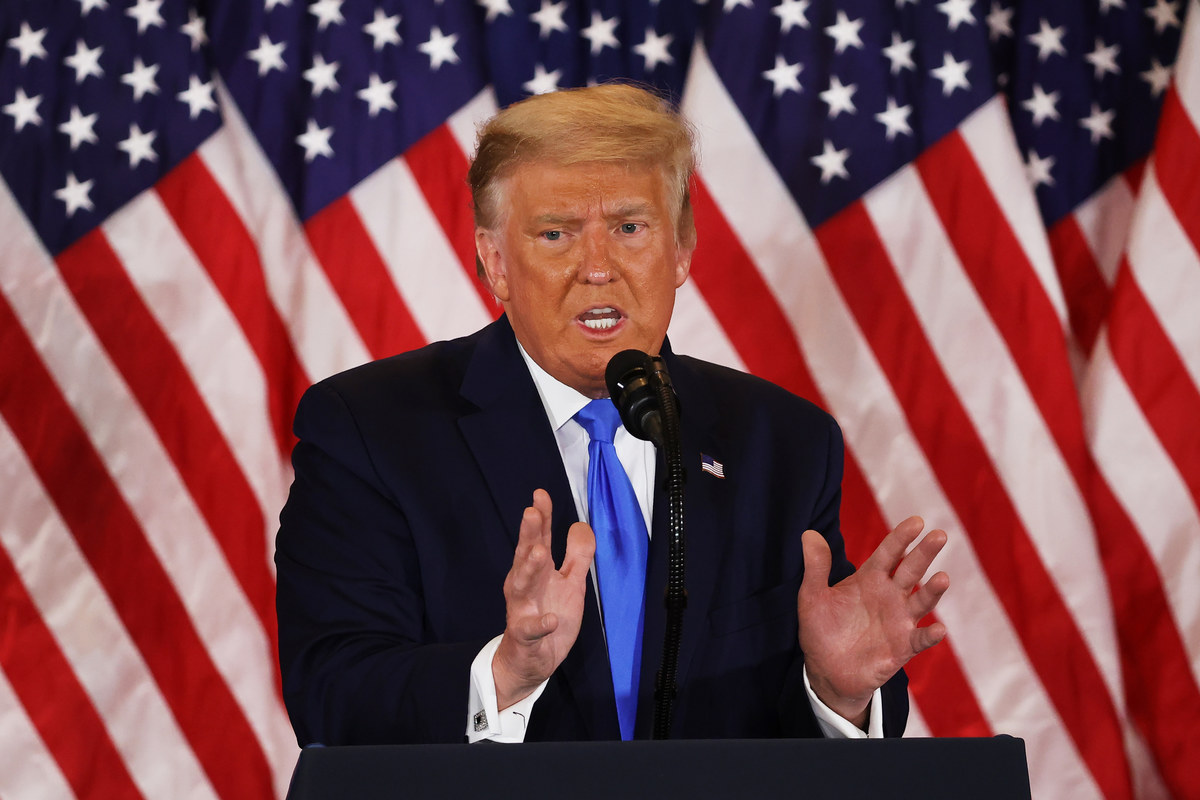
He goes on to remind supporters what he has won, claiming Georgia before it has been called. He also claims North Carolina.
“We have had such a big night, look at all the states we have won.”
#LIVE: #Republican candidate President @realDonaldTrump speaks on election night from the White House #USElections https://t.co/RhVzsnZRXC https://t.co/DoZu8lnkQD
— Arab News (@arabnews) November 4, 2020
Says Florida was a “tremendous victory.”
Declares the election a “fraud” and says “frankly we have won this election.”
06:39 - News wire Reuters says Donald Trump is expected to speak at 07:00 (GMT)
Meanwhile Twitter has flagged a tweet by Trump alleging an effort to steal the election was potentially misleading.
Facebook also flagged a Trump post which said: "We are up BIG." The social media company said "final results may be different from initial vote counts as ballot counting will continue for days or weeks."
06:15 - RESULT: Trump wins Texas and its 38 electoral votes despite a furious push by Democrats to turn America’s biggest red state blue and closing the gap even more between the two candidates.
06:00 - Trump has started to narrow the gap - he's now at 212 votes compared to Biden's 223 - it really is anyone's race at the moment.

05:50 - During his speech Biden, briefly appearing in front of supporters in Delaware, urged patience, saying the election “ain’t over until every vote is counted, every ballot is counted.”
“It’s not my place or Donald Trump’s place to declare who's won this election," Biden said. "That’s the decision of the American people.”
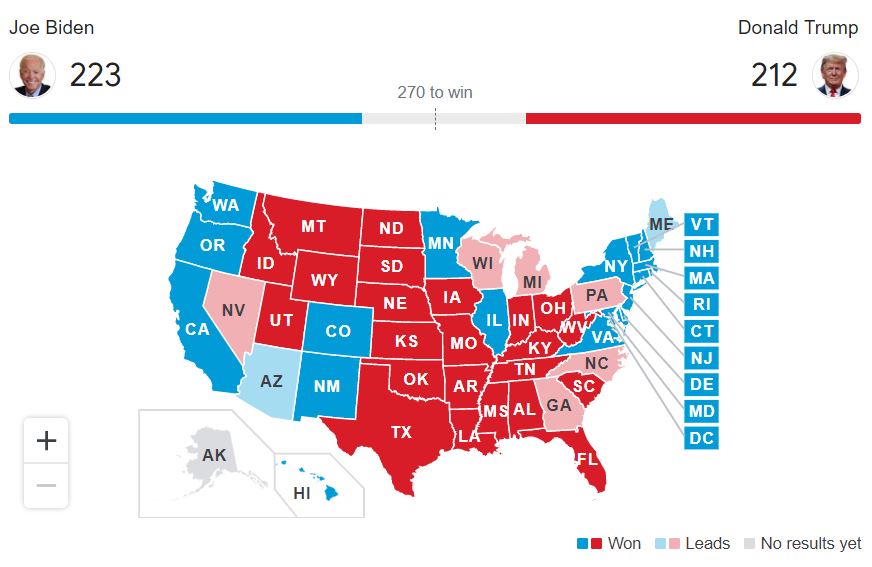
05:42 - Biden tells supporters "We feel good about where we are." He concedes it could be a few days before the final result is called. "We could know the result by tomorrow morning, but it could take a while longer." But he remains confident of a win: "Keep the faith guys," he tells supporters.
#LIVE: #JoeBiden expected speaks on #elections night at the Chase Center in #Delaware More: https://t.co/2YsMakHZ6P https://t.co/6ZPZgr7puM
— Arab News (@arabnews) November 4, 2020
05:40 - RESULT: Trump wins Florida - that's an important one for the President
05:21 - RESULT: Ohio is called - Donald Trump wins with 53.5 percent of the vote.
04:20 - Several hundred Biden supporters had rallied near the White House early on Tuesday, but by nightfall the festive atmosphere had given way to nervous tension as people fixed their attention on giant screens showing disappointing early results...

03:50 - We have four more states with closed polls, and it's four more electoral votes called by Associated Press - Biden winning California, Oregon and Washington; Trump claiming Idaho.
It means the provisional electoral vote running total stands at 209 for Biden and 112 for Trump. The battle for Pennsylvania, Michigan and Wisconsin looks like deciding this election.
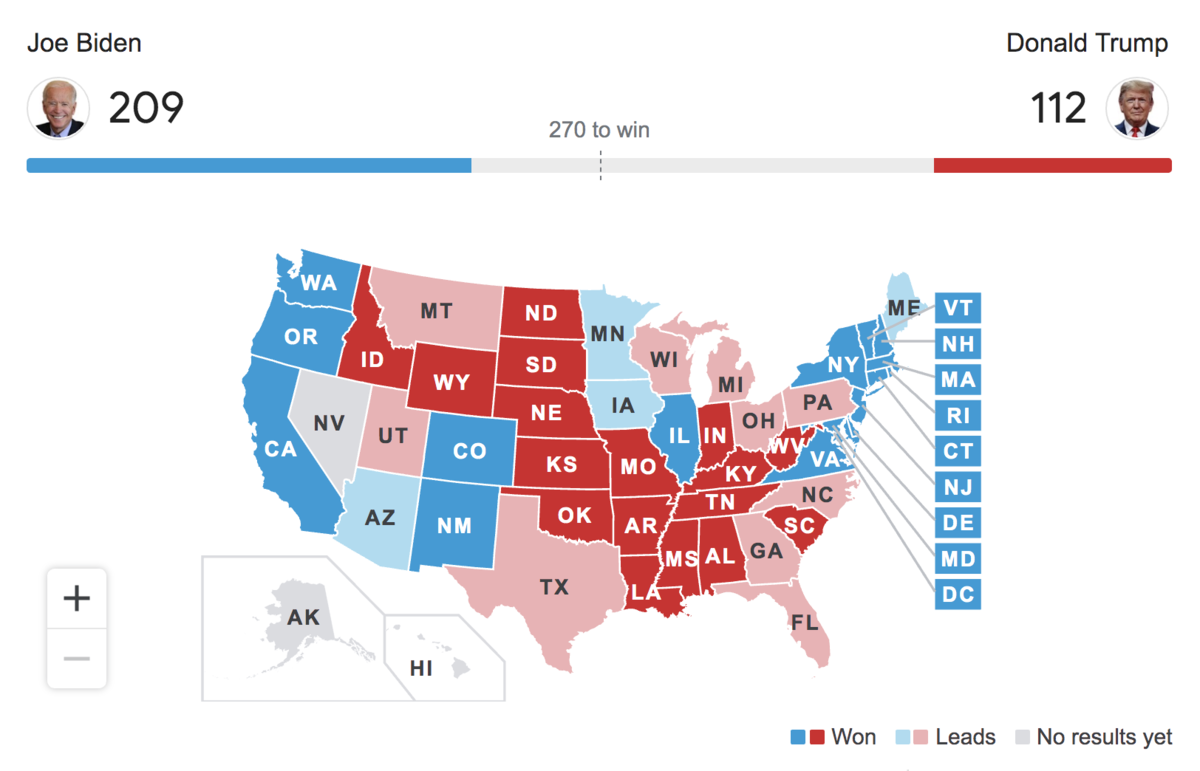
03:10 - Live footage from the Black Lives Matter Plaza outside the White House...
02:40 - After very promising early results for Joe Biden in key states like Florida and Ohio, and in Republican heartlands of Texas and North Carolina, Donald Trump is fighting back and as of 02:40 GMT has retaken the lead in Florida, Ohio and Texas. North Carolina now in the balance...
02:05 - RESULTS: Various projections calling the states of New York and New Jersey for Biden...
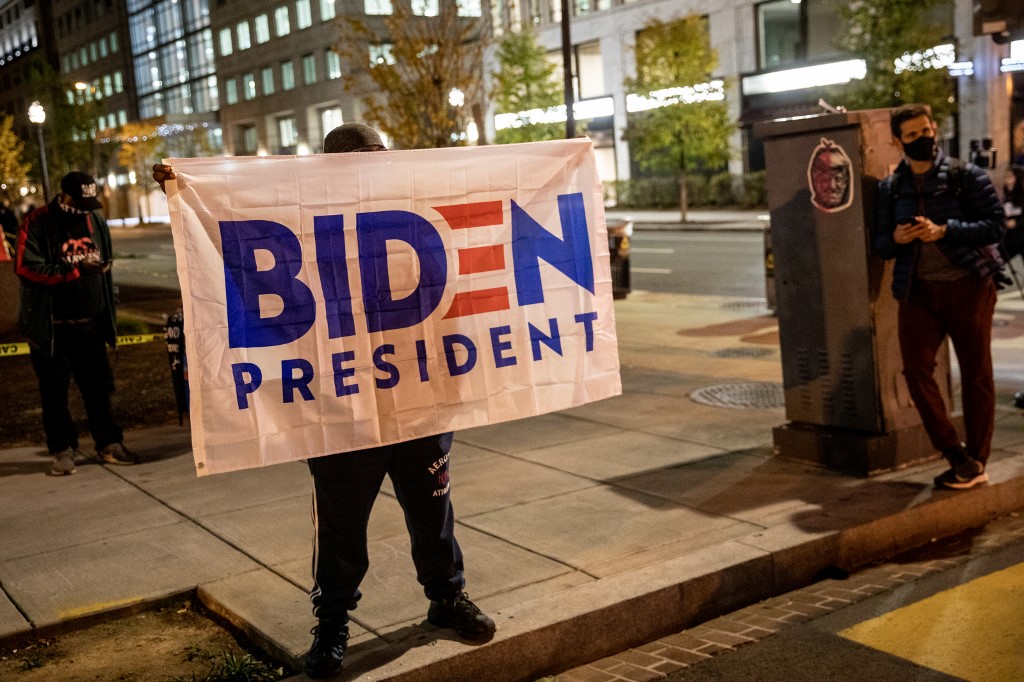
02:00 - Polls are now closing in several states, including the important ones of Arizona, Michigan and Wisconsin - the latter two are where Biden was winning in the pre-election polls. The key result of Arizona is expected relatively quickly....
01:30 - RESULT: In one of the least surprising results of the night, Donald Trump picks up another state - the staunchly Republican Arkansas.
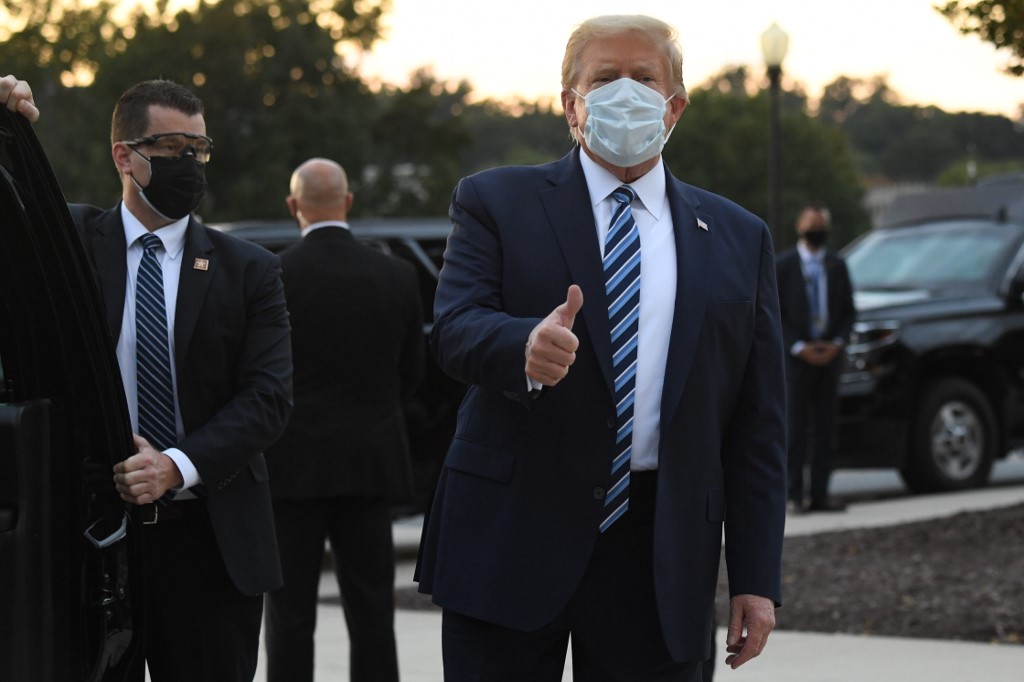
01:10 - RESULTS: Polls are closing thick and fast across the country now, and Associated Press has just called several states - seven for Biden and four for Trump.
BIDEN: Rhode Island, New Jersey, Massachusetts, Maryland, Illinois, Delaware and Connecticut.
TRUMP: Oklahoma, Tennessee, Mississippi and Alabama.
01:00 - RESULT: Trump has won the state of South Carolina, according to Associated Press projections, with its 9 electoral votes.
Trump won the state in 2016, and South Carolina has not voted for a Democratic presidential candidate since Jimmy Carter in 1976.
00:40 - RESULT: Biden hits back with a projected win in Virginia, with Associated Press giving the 13 electorial votes to the Democratic candidate.

00:35 - RESULT: In a heavily expected win, Trump claims West Virginia, giving the him another five electoral votes.

00:25 - Polls have now closed in the crucial battleground states of North Carolina and Ohio, both of which Donald Trump won in 2016, but Biden’s has been playing up his chances of winning North Carolina today.
00:05 - RESULT: Various outlets project Trump wins Indiana and Kentucky - 11 and 8 electoral votes respectively.
Meanwhile, Associated Press has projected a win in Vermont for Biden, worth 3 electoral votes.
TUESDAY NOVEMBER 3
23:55 - We're minutes away from the polls closing in the key battleground states in 2020's election of Florida and Georgia. We'll keep you updated as soon as results start to come in.
23:45
23:30 - Hundreds of Biden supporters rallied at the White House Tuesday evening, fueling a festive atmosphere with blasting music and dancing activists who voiced faith Democrats could win back the presidency.
The area, recently named Black Lives Matter (BLM) Plaza by the mayor of Washington, was the focal point of opposition to President Donald Trump during racial justice protests over summer.
23:10 - RESULT: The first polls have now closed, in parts of Kentucky and the home state of incumbent Vice President Mike Pence Indiana.
Trump is likely to win both states, which traditionally vote Republican. And in the first result of the night, he wins 68% of the vote in Indiana's Greene County.
22:55
The President’s going to be watching returns tonight with senior aides, with members of the first family from the White House, from the East Wing. He’s excited. We’ve put in the work, we’ve not taken any vote for granted, he’s been out on the trail meeting with voters, doing as many as five events a day, and we’re ready to see these results.
White House Communications Director Alyssa Farah
22:40 - A third of voters listed the economy as the issue that mattered to them most, according to an Edison Research exit poll.
Two out of 10 voters said COVID-19, which has infected more than 9.4 million people in the US this year and killed more than 230,000, was the most important issue to them.
Racial inequality was also cited by 20 percent of voters, while other respondents cited crime and safety and healthcare policy.
Half the voters said it was more important to contain the coronavirus even if it hurts the economy, according to the exit poll.
22:30
22:10 - With the polls in the final few hours before closing, Arab News readers took part in a poll of their own and just over half of you said Donald Trump would win re-election to the White House. Read our coverage of the election so far here.
21:55 - In this election, it looks likely that the US is set for the highest voter turnout for more than a century. See more images of the day's polling here.
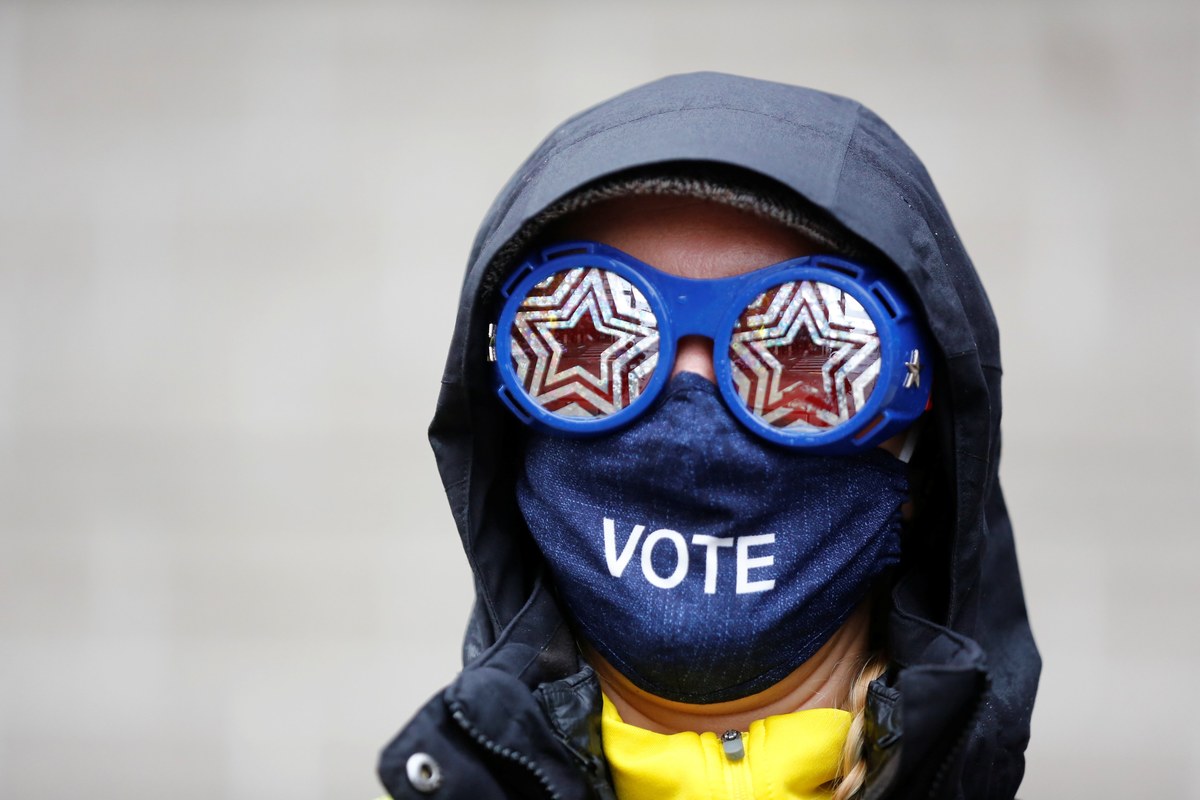
21:45 - Biden says he “feels good” about the prospects of re-establishing a “Blue Wall,” adding that while he remains “hopeful” he is superstitious about making any predictions.
We’ll see. If there’s something to talk about tonight, I’ll talk about it – if not, I’ll wait till the votes are counted. There’s so much in play right now, the idea that I’m in play in Texas, Georgia, Florida – I mean, come on.
Joe Biden
21:40 - We have seen some heated exchanges between Biden and Trump supporters across the US throughout the day, but despite the partisan nature of the vote the vast majority of gatherings have remained passionate buit peaceful.
21:25 - The Secretary of State for Michigan Jocelyn Benson has spoken to CNN and said the state's count will be expected sooner than expected — likely to be reported soon after the polls have closed.
“What we've seen is such high efficiency and so little problems that I now think we'll clearly get results much sooner. We anticipate a mix of both in-person voting results and absentee voting results will be part of the results, the first results, you hear out of Michigan.”
21:10 - Joe Biden, still out campaigning in the final few hours before the polls close, was in his hometown state of Philadelphia where he received a rapturous welcome. He had a very familiar message — no red or blue states, just the United States — for the crowds who were chanting “Joe, Joe, Joe.”
21:00 - Reports coming in that the FBI is investigating alleged “robocalls” urging voters to “stay at home to stay safe,” telling some voters they will be allowed to vote tomorrow if queues at polling stations are too long — despite voting ending on Tuesday evening.
A Cybersecurity and Infrastructure Security Agency official said: “There were some robocalls that were being reported … robocalls happen every election. We are aware of that. Those calls, the FBI is investigating.
“Robocalls of this nature happen every election and so I think what would be most helpful is repeating that message to the American public that... they happen every election cycle. Be mindful of people that are trying to intimidate you, undermine your confidence, but keep calm, vote on.”
When asked in which states the calls were being received, and who might be behind them, the CISA official said the FBI was “tracking down the issue.”
20:50
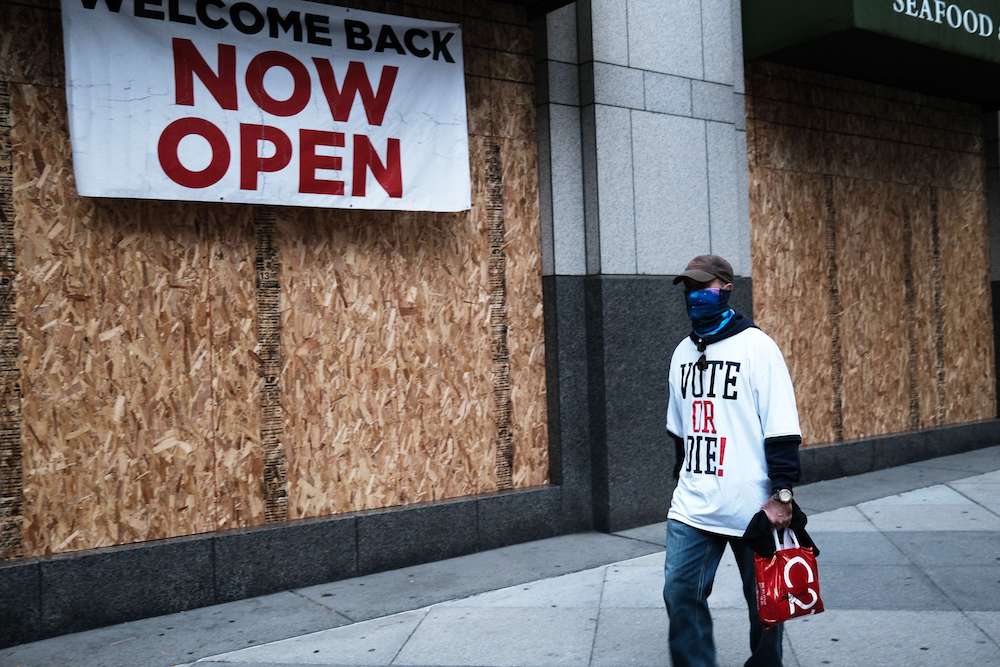
The fear to rioting and violence after today’s voting really seems to be dominating a lot of coverage of the election.
Our correspondents Ray Hanania and Ephrem Kossaify have been reporting today on those concerns and how Americans have been preparing for unrest.
READ MORE: America prepares for post-election violence
Deputy US marshals stand ready to respond to violent acts of civil disobedience in any location in the nation.
US Marshals Service
20:35

Earlier we mentioned the significance of the Arab American vote, but Arab News has also taken a deep dive into how Arabs outside of the US view the election.
We commissioned a YouGov poll spanning 18 Middle East countries to canvas opinion on the presidential race. The findings were both detailed and at times surprising.
While most said Biden would be better for the region than Trump, they said Biden, who served as vice president to Barack Obama until 2017, should shed the Obama policies towards the Middle East. Obama is often criticized for being too soft on Iran.
READ MORE: Full coverage of the YouGov poll What do Arabs want
Arabs overwhelmingly hope Biden parts ways with Obama legacy: poll
20.00 - Joe Biden addressed supporters in Philadelphia, Pennsylvania, praising the six of the turnout. He also sent some final fiery jabs in Trump’s direction.
He said the president thinks he can decide who gets to vote. “Well, guess what? The people who are going to decide who gets to be president! Just have to remember who we are, dammit. This is the United States of America!,” he said.
We're going to have more people vote this year than anytime in American history
Joe Biden
19:40 - Joe Biden's running mate Kamala Harris spoke as she arrived in Detroit, addressing fears of post-election unrest that have overshadowed voting. The 56-year-old vice-presidential nominee will be watched closely whatever the outcome of the election. Many analysts say her relative youth compared with the 77-year-old Biden means it is likely that a Democratic win could eventually see her hold the presidency.
"Have faith in the American people. I do strongly believe that we - whoever we vote for - will defend the integrity of our democracy and the peaceful transfer of power. And that there are certain lines that no matter who you vote for, they won't cross."
Kamala Harris
19:10 - How will Arab Americans vote? This demographic may not pack the voting power of the black and hispanic communities, but they are heavily engaged in US politics. According to a recent story by Arab News correspondent Ray Hanania Arab American voters support both the conservatism of Republicans and the social equity policies of the Democrats.
Biden attempted to energize this Arab American voters with a six-page Plan for Partnership calling for the support and engagement of the community.
READ MORE: Arab American voter activism rallies around Nov. 3 election

18:40 - Donald Trump visited his campaign headquarters in Virginia where he was cheered by dozens of workers there. He said his campaign was doing well in Florida, Arizona and Texas and he mentioned the importance of winning Pennsylvania. The state is seen as key for Trump to win of he is to stay in the White House.
“I think we’re going to have a great night, but it’s politics and it’s elections and you never know.”
Donald Trump
18:10 - First Lady Melania Trump cast her vote in Palm Beach, Florida, close to President Donald Trump’s Mar-a-Lago resort. Her husband voted in person last month during early voting.
Melania Trump has appeared only a handful of times on the campaign trail and laid low for several weeks after she contracted COVID-19, along with her husband, in October.
On Monday she gave a rare speech in which she blasted Joe Biden over law and order.
'When rioters and looters were burning our cities and wrecking small businesses that belong to hard working families and bring jobs to our communities, where were the Democrats?'
Melania Trump
18:00 - While all eyes are on the intense battle between Donald Trump and Joe Biden, another key battlefield is the race to control the US Senate. If Democrats can win at least six Republican-held Senate seats, they would take control of the Senate - and gain the upper hand in key votes that can block or reverse many presidential actions and override a presidential veto.
Arab News US correspondent Ray Hanania has written more here on this fascinating battle.
17:35 - Under the US voting system, either Donald Trump or Joe Biden needs to reach 270 of the total 538 Electoral College votes to win. Each state is assigned a certain number of “electors" depending the number of congressional districts. In all but two states, the winner of the popular vote takes all the Electoral College votes.
This explains why across the whole of the US in 2016, Hillary Clinton won more than almost 3 million more votes from individuals than Trump. But she lost the election because Trump managed to win more electoral college votes.
As the results start to come in later today you can keep track of the numbers on our interactive widget available here on our Facebook page or on our main US election page www.arabnews.com/us2020election.

17:00 - Security and fear of violence and rioting have become a major concern as the election reaches its climax. In cities across the US, shops and businesses have boarded up their windows and their have been reports of an increase in gun purchases.
The elections take place against a backdrop of unrest in the US after the killing by police of unarmed black man George Floyd.
Arab News correspondent Ephrem Kossaify reported today from Manhattan where stores, which were vandalised earlier in the year, were preparating for possible rioting of looting.
On Monday, Arab News reported on similar measures being taken in Los Angeles where upmarket shops along Rodeo Drive in Beverly Hills were also boarding up.
16:30 - Earlier, the two candidates made their final appearances as voting got under way.
Donald Trump appeared on “Fox & Friends,” where he predicted he will win by a larger electoral margin than he did in 2016. Trump said he believes the large crowds at his final rallies are the “ultimate poll.”
Joe Biden started the day visiting a church in Delaware where his late son Beau Biden is buried. He then traveled to his childhood home in Scranton in the swing state of Pennsylvania. “It’s good to be home!” he told supporters.
16:05 - With so many people casting their ballots by post it was unclear how big the queues at polling stations will be. However, with a large turnout expected across the board, many polling stations were busy across the country where they had opened.
To see more images of Americans finally going to the polls, click here: https://arab.news/nwgtt
15:50 - Arab News correspondent Ephrem Kossaify joined voters at the Queen of Angels Parish Center in New York, which has been converted into a polling station.
Many people had queued for several hours in the morning to vote.
15:30 - Voting has been under way for several hours now across the eastern seaboard of the United States. Wearing masks, voters arrived at polling stations as the day finally arrived after a long and bitter campaign.
Most polls open at 6 a.m. local time with the latest staying open until 9 p.m.
(With agencies)






